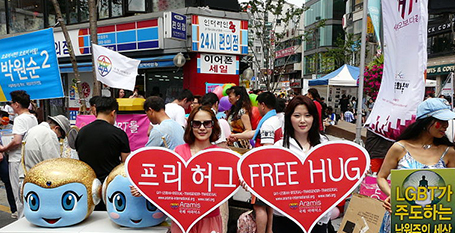For the first time in its 16-year history, the South Korea Pride Parade has not been granted by police, according to the Korea Observer.
Namdaemun Police Station and Seoul Metropolitan Police Agency denied permit for the pro-LGBT march, anticipating a standoff between LGBT and conservative Christian groups.
Last year, groups affiliated to the Church laid on the road, blocking the parade. Their protest caused major traffic jams and created tension with the LGBT community.
This year, the Korea Queer Culture Festival (KQCF), who organize the march, applied for a public space to hold the parade. The application was rejected as the space was already reserved by the "Love Your Country, Love Your Children Movement," an anti-LGBT Christian group.
Members of the LGBT community therefore tried to secure a new space in the Namdaemun region. Members of the Christian group and the LGBT community both lined up on May 20 submit competing applications for the new space. Individuals waited in line all day and night to lodge the application as early as possible.
However, on May 30, police issued a prohibition notice based on Article 8 of the Act on Assemblies and Demonstrations that banned both groups from holding street marches: “Rallies may be banned wherever two or more rallies are planned by groups with conflicting goals and on Article 12 where rallies may be banned whenever there is a possibility of inconvenience to pedestrian and vehicle traffic.”
The KQCF released this press statement on Monday: “The decision is suppressing the right of sexual minorities to speak up against society, as well as instigating hatred and violence against sexual minorities. Seoul Metropolitan Police Agency and Seoul Namdaemun-gu Police Station should withdraw its ban on outdoor rallies on May 30th, 2015 at once, and should guarantee the Pride Parade at KQF to be held safely and peacefully.”
Activists are appealing the police decision to withhold permission for the pride parade. Regardless, they plan to carry on with a stationary festival at a plaza in downtown Seoul. The government’s blithe indifference won’t quash the LGBT community’s pride, but South Korea can and should do better.

